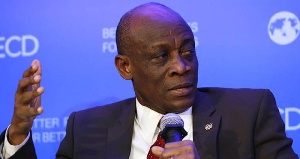Former Finance Minister Seth Terkper has accepted responsibility for the collapse of some seven indigenous banks in the country that has caused almost 2,000 job losses within a year.
Mr. Terkper however said he cannot be blamed for the financial mess that has shaken the foundation of the banking industry.
“I will take responsibility not the blame; you can do the blame game,” he told Johnny Hughes when he appeared on TV3 morning magazine show, New Day on Thursday to speak about the issue.
Seven indigenous banks have collapsed in the last year after the Bank of Ghana revoked their licence for being highly insolvent.
While the Ghana Commercial Bank took over the good assets of UT and Capital banks which collapsed in August 2017, five others whose collapsed were announced by BoG on August 1, 2018 have been consolidated to form the Consolidated Bank Ghana Limited.
They are Royal, Construction, Beige, UniBank and Sovereign banks
When asked Thursday whether he accepts blame for the collapse, Mr. Terkper responded negatively, contending that the government at the time took steps to prevent the crisis which has been squarely been blamed on the Bank of Ghana as well as the directors and the boards of the collapsed banks.
The former finance minister said through ESLA, the government paid a substantial amount of the VRA’s legacy debt, which he observed, weighed heavily on the banking sector at the time.
The debt, he said “exposed the banking sector to the possibility of systemic risk as the magnitude of the exposure weigh heavily on the assets quality of the banks”, adding that as at the end of December 2016, “$228.82 million [of the debt] had been paid”.
Again, Mr. Terkper indicated that the debt of state owned enterprises, especially to contractors in the road sector had serious consequences on the banks in the country.
“The largest component of arrears which is owed to contractors is owed banks.”
In his view, if the current government should have followed in the line of the past government by seeking a similar restructuring for the road sector as did with the energy sector, the situation at the banking sector could have been averted.
“…Could a similar restructuring [like the energy one] early enough save us the situation? I believe so because when we did it there weren’t a lot of noise, there wasn’t fear and panic and we were open and said this is the solution,” he argued.
He implied the IMF conditions prevented the Finance Ministry from having a hand in the affairs of the Bank of Ghana which is responsible for the banking sector.
“Under my watch in the overall management of events, I believe you were also privy to the debate; a very intense one which was IMF condition about how government was to allow autonomy to the central bank,” he said but added, “That doesn’t absolve us”.
Beyond that, he pointed out that it is not only the governor of BoG who works at the central bank as there are other people who work there “who may have different motives”.
While he said the BoG carried out its audit, “we also did some audit particularly on SOEs and saw the impact. But what I’m saying is that should we have the central bank beyond anybody’s oversight? Probably we need to look at that just like the Federal Reserve and others don’t come to the Minister of Finance because there could be interference. They go to parliament”.
Asked whether feel responsible for the job losses arising out of the collapsed banks he said: “If I didn’t feel responsible, I would go in an election year or close to an election year to ask for a levy to save jobs and we did this restructuring with 11 banks, I believe 13”
General News of Thursday, 30 August 2018
Source: 3news.com

















